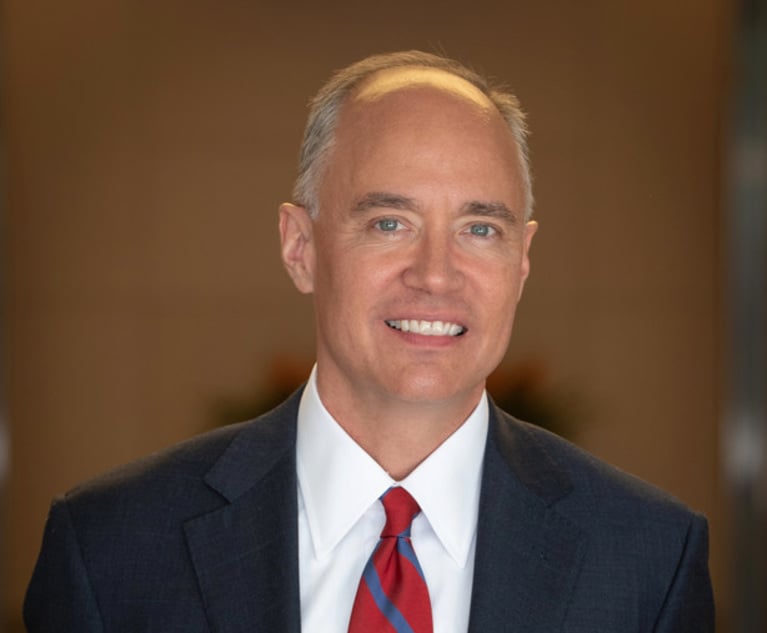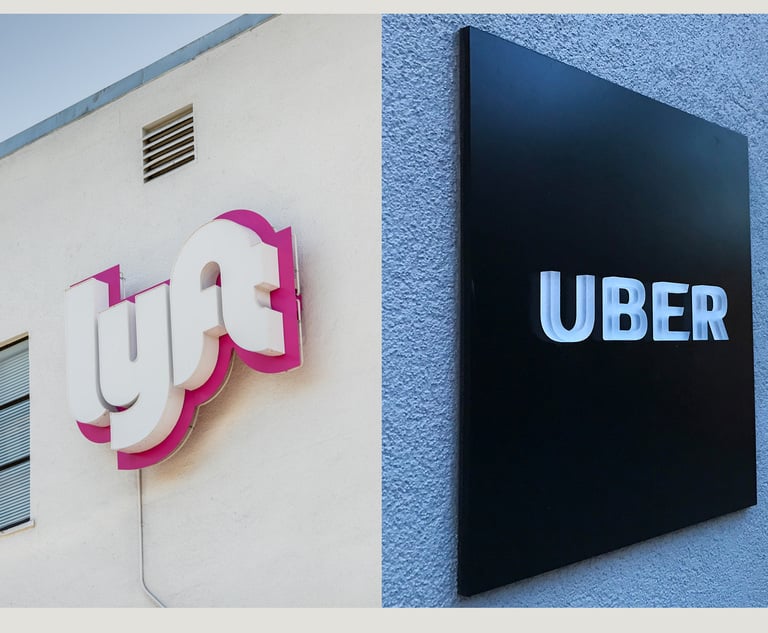 Michael L. Slack, managing partner of Slack Davis Sanger L.L.P.
Michael L. Slack, managing partner of Slack Davis Sanger L.L.P.Reexamining Boyles: An Argument for Exempting Negligent Infliction of Emotional Distress Claims Against Common Carriers
Since 1993, the Texas Supreme Court's decision in Boyles v. Kerr has held steadfast for the proposition that there is no cause of action in Texas…
January 21, 2020 at 03:20 PM
7 minute read
Since 1993, the Texas Supreme Court's decision in Boyles v. Kerr has held steadfast for the proposition that there is no cause of action in Texas for negligent infliction of emotional distress in the absence of physical injury. Boyles was a college student who covertly taped sex with his former girlfriend. Kerr then sued alleging invasion of privacy and negligent infliction of emotional distress. While it is difficult to imagine the Court reaching the same decision today, 30 years ago the Supreme Court felt the need to limit the circumstances in which recovery for emotional distress could occur in the absence of a physical injury.
While Boyles concluded there was no general duty not to inflict emotional distress, the Court held open the possibility that "certain [special] relationships may give rise to a duty which, if breached, would support an emotional distress award." The Boyles Court conceded the need to except its harsh rule where there is "some specific duty of care that, under the law, arises from the relationship." Thus, to the extent that a recognized special relationship exists to create a duty between a tortfeasor and the claimant, recovery of emotional distress damages absent a physical injury may be possible.
The potential applicability of Boyles prominently arose on April 17, 2018, when Dallas-bound Southwest Airlines Flight 1380 experienced a catastrophic uncontained engine failure at 32,000 feet and fragments of the engine inlet and cowling struck the left side of the aircraft's fuselage and breached a passenger window, resulting in a rapid depressurization. Tragically, one passenger seated next to a window mid-cabin was pulled from her seat and partially out of the adjacent cabin window.
As the plane lurched and the pilots regained control and put the plane into a rapid descent, the passengers endured unimaginable horror and justifiable fears that the plane would inevitably crash, and they would be killed. They began recording videos, texting and phoning loved ones to explain what they were going through and share parting words. A few heroic passengers on board rallied in desperation to pull the passenger back into the plane and attempt to resuscitate the horribly injured passenger. Unfortunately, that passenger perished but the other passengers were emotionally traumatized by the experience even though the pilots calmly, successfully and skillfully managed the emergency and safely landed the plane.
There were no thoughts of Boyles in the chaos of the moment or for days later as passengers reunited with family and loved ones and struggled to put the horrific events in the past. As the medical literature teaches, an extended exposure to emotionally traumatic stimuli when the subject has no control over the circumstances will almost always result in a high risk of the post-traumatic stress or anxiety disorder, both of which are seriously debilitating conditions.
After all these passengers had endured combined with the emotional deterioration that had begun for most, those who were Texas citizens soon learned that Boyles could preclude recovery for their claims of emotional distress against the airline absent serious physical injury. How could a 30-year-old case involving the surreptitious videotaping of college students having sex possibly bar emotional distress claims against an airline or other potentially culpable parties like Boeing on a scheduled airline flight when a catastrophic engine failure occurs?
Looking back at Boyles, we find two examples of special relationships discussed in the opinion that give rise to a duty that would support an emotional distress award. The first example given was the failure of a telegraph company to timely deliver a death message, and the second was a funeral home's negligent handling of a corpse. At the heart of the special relationship exception articulated in Boyle is the Court's concern for the foreseeability of emotional distress arising from the conduct in question.
In 2018 the Texas Supreme Court decided SCI Funeral Services, Inc. v. Nelson, recognizing that the concern of foreseeability of emotional distress is alleviated by the existence of a special relationship by "ensuring that the injury and the injured party are foreseeable to the defendant." The Nelson Court reiterated the holding in Boyle and held that emotional distress or mental anguish damages are recoverable when the defendant breaches some other legal duty.
That brings us to question why Boyles should apply in the context of emotional injuries occurring to passengers while in the care of common carriers. In Texas, common carriers are defined by case law as "one that solicits and operates a public passenger transportation service." Various forms of transportation including railroads, buses, airplanes, taxis, street cars, and other vehicles are included in this definition. According to a 1986 San Antonio Court of Appeals decision, Howell v. City Towing Associates, the well-settled rule regarding common carriers is that they "owe passengers the duty to exercise the highest degree of care in the operation of the conveyance and in the boarding and alighting of passengers." This duty, involving the highest degree of care, is exactly the type envisioned by the Boyles Court when it delineated the special relationship exception to the general bar from recovery for negligently inflicted emotional distress. By accepting compensation from passengers in return for their transportation, common carriers are entrusted with the heightened duty of ensuring safe transport. Common carriers, in return, insure themselves against injuries to passengers. Federal regulations require many common carriers, like airlines, to insure. Common carriers not only have a duty to aid and protect their passengers from the risks of harm that arise in the course of that relationship but they are in a far better position to bear the risk of loss rather than imposing an uncompensated loss on passengers by invoking Boyles when confronted with an emotional distress claim.
It is time for the Texas high court to apply the special relationship rationale of Boyles to passengers of common carriers to permit recovery of emotional distress damages arising from negligence. Paying passengers relinquish total control of their safety to their common carriers. Passengers have no ability to make anything but a blind and uninformed choice of their common carrier with no opportunity of means to assess the skills of the operator, its maintenance records or its safety record with regulators. Thus, passengers are left with no realistic way of avoiding or defending themselves from dangers posed by common carriers. Sound public policy and the special relationship between common carriers and their passengers clearly justifies and compels a fresh reexamination of Boyles that affirmatively permits passengers of common carriers to assert negligent infliction of emotional distress claims even in the absence of physical injuries.
Michael L. Slack is the managing partner of Slack Davis Sanger L.L.P., which has offices in Austin, Dallas and Fort Worth. Mr. Slack handles plaintiff catastrophic personal injury and death cases with a primary emphasis on aviation crash litigation in the United States and internationally. He is Board Certified in Personal Injury Trial Law, is a member of ABOTA and a Past President of the Texas Trial Lawyers Association.
This content has been archived. It is available through our partners, LexisNexis® and Bloomberg Law.
To view this content, please continue to their sites.
Not a Lexis Subscriber?
Subscribe Now
Not a Bloomberg Law Subscriber?
Subscribe Now
NOT FOR REPRINT
© 2025 ALM Global, LLC, All Rights Reserved. Request academic re-use from www.copyright.com. All other uses, submit a request to [email protected]. For more information visit Asset & Logo Licensing.
You Might Like
View All
Patent Disputes Over SharkNinja, Dyson Products Nearing Resolution

Revisiting the Boundaries Between Proper and Improper Argument: 10 Years Later
8 minute read
'Serious Disruptions'?: Federal Courts Brace for Government Shutdown Threat
3 minute read
Uber Not Responsible for Turning Over Information on 'Dangerous Riders' to Competitor, Judge Finds
5 minute readTrending Stories
Who Got The Work
Michael G. Bongiorno, Andrew Scott Dulberg and Elizabeth E. Driscoll from Wilmer Cutler Pickering Hale and Dorr have stepped in to represent Symbotic Inc., an A.I.-enabled technology platform that focuses on increasing supply chain efficiency, and other defendants in a pending shareholder derivative lawsuit. The case, filed Oct. 2 in Massachusetts District Court by the Brown Law Firm on behalf of Stephen Austen, accuses certain officers and directors of misleading investors in regard to Symbotic's potential for margin growth by failing to disclose that the company was not equipped to timely deploy its systems or manage expenses through project delays. The case, assigned to U.S. District Judge Nathaniel M. Gorton, is 1:24-cv-12522, Austen v. Cohen et al.
Who Got The Work
Edmund Polubinski and Marie Killmond of Davis Polk & Wardwell have entered appearances for data platform software development company MongoDB and other defendants in a pending shareholder derivative lawsuit. The action, filed Oct. 7 in New York Southern District Court by the Brown Law Firm, accuses the company's directors and/or officers of falsely expressing confidence in the company’s restructuring of its sales incentive plan and downplaying the severity of decreases in its upfront commitments. The case is 1:24-cv-07594, Roy v. Ittycheria et al.
Who Got The Work
Amy O. Bruchs and Kurt F. Ellison of Michael Best & Friedrich have entered appearances for Epic Systems Corp. in a pending employment discrimination lawsuit. The suit was filed Sept. 7 in Wisconsin Western District Court by Levine Eisberner LLC and Siri & Glimstad on behalf of a project manager who claims that he was wrongfully terminated after applying for a religious exemption to the defendant's COVID-19 vaccine mandate. The case, assigned to U.S. Magistrate Judge Anita Marie Boor, is 3:24-cv-00630, Secker, Nathan v. Epic Systems Corporation.
Who Got The Work
David X. Sullivan, Thomas J. Finn and Gregory A. Hall from McCarter & English have entered appearances for Sunrun Installation Services in a pending civil rights lawsuit. The complaint was filed Sept. 4 in Connecticut District Court by attorney Robert M. Berke on behalf of former employee George Edward Steins, who was arrested and charged with employing an unregistered home improvement salesperson. The complaint alleges that had Sunrun informed the Connecticut Department of Consumer Protection that the plaintiff's employment had ended in 2017 and that he no longer held Sunrun's home improvement contractor license, he would not have been hit with charges, which were dismissed in May 2024. The case, assigned to U.S. District Judge Jeffrey A. Meyer, is 3:24-cv-01423, Steins v. Sunrun, Inc. et al.
Who Got The Work
Greenberg Traurig shareholder Joshua L. Raskin has entered an appearance for boohoo.com UK Ltd. in a pending patent infringement lawsuit. The suit, filed Sept. 3 in Texas Eastern District Court by Rozier Hardt McDonough on behalf of Alto Dynamics, asserts five patents related to an online shopping platform. The case, assigned to U.S. District Judge Rodney Gilstrap, is 2:24-cv-00719, Alto Dynamics, LLC v. boohoo.com UK Limited.
Featured Firms
Law Offices of Gary Martin Hays & Associates, P.C.
(470) 294-1674
Law Offices of Mark E. Salomone
(857) 444-6468
Smith & Hassler
(713) 739-1250






